Partnerships in Health and Illness: Survivorship Care Plan (NSB303)
VerifiedAdded on 2022/11/24
|10
|2479
|127
Report
AI Summary
This report details a survivorship care plan designed for John, a patient completing chemotherapy for colorectal cancer. It outlines the essential components of a discharge plan, including diagnosis, symptoms, and treatment summaries, as well as recommended follow-up regimes, which encompass surveillance strategies, diagnostic tests, and management of long-term impacts. The plan addresses psychosocial, spiritual, physical, and social concerns experienced by cancer survivors, and proposes interventions like self-management programs focusing on diet, exercise, and communication strategies. The report emphasizes goal-setting and health education to promote behavior modification, referencing evidence-based approaches to address concerns such as fatigue, bowel function, and recurrence risks. It also emphasizes the importance of care coordination and highlights the four key domains of survivorship care: prevention, surveillance, intervention, and care coordination. The plan aims to provide tailored information to support colorectal cancer survivors and improve their quality of life.

Partnerships in Health and Illness: Survivorship Care Plan
Student’s Name
Institution Affiliation
Student Number & Student ID 1
Student’s Name
Institution Affiliation
Student Number & Student ID 1
Paraphrase This Document
Need a fresh take? Get an instant paraphrase of this document with our AI Paraphraser
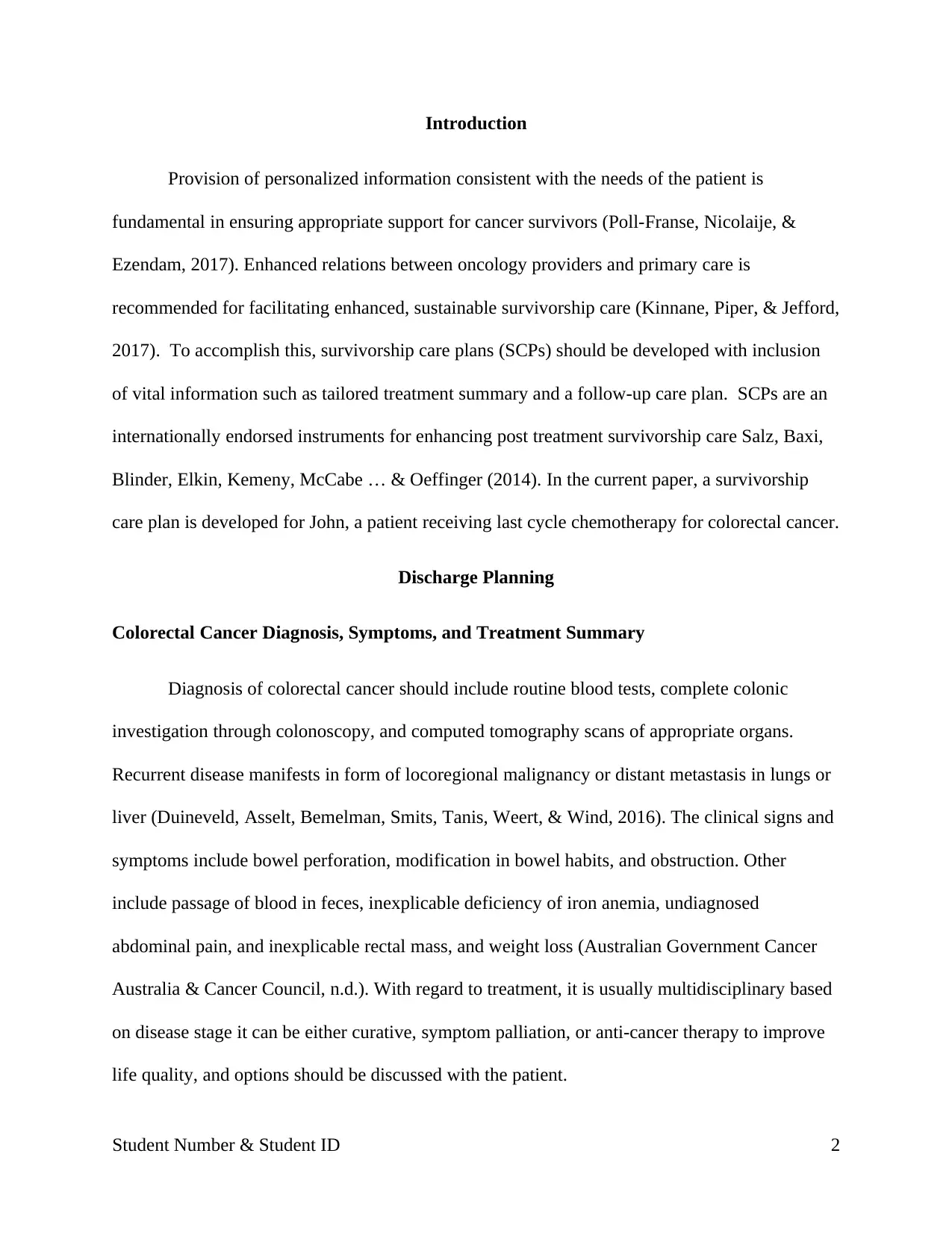
Introduction
Provision of personalized information consistent with the needs of the patient is
fundamental in ensuring appropriate support for cancer survivors (Poll-Franse, Nicolaije, &
Ezendam, 2017). Enhanced relations between oncology providers and primary care is
recommended for facilitating enhanced, sustainable survivorship care (Kinnane, Piper, & Jefford,
2017). To accomplish this, survivorship care plans (SCPs) should be developed with inclusion
of vital information such as tailored treatment summary and a follow-up care plan. SCPs are an
internationally endorsed instruments for enhancing post treatment survivorship care Salz, Baxi,
Blinder, Elkin, Kemeny, McCabe … & Oeffinger (2014). In the current paper, a survivorship
care plan is developed for John, a patient receiving last cycle chemotherapy for colorectal cancer.
Discharge Planning
Colorectal Cancer Diagnosis, Symptoms, and Treatment Summary
Diagnosis of colorectal cancer should include routine blood tests, complete colonic
investigation through colonoscopy, and computed tomography scans of appropriate organs.
Recurrent disease manifests in form of locoregional malignancy or distant metastasis in lungs or
liver (Duineveld, Asselt, Bemelman, Smits, Tanis, Weert, & Wind, 2016). The clinical signs and
symptoms include bowel perforation, modification in bowel habits, and obstruction. Other
include passage of blood in feces, inexplicable deficiency of iron anemia, undiagnosed
abdominal pain, and inexplicable rectal mass, and weight loss (Australian Government Cancer
Australia & Cancer Council, n.d.). With regard to treatment, it is usually multidisciplinary based
on disease stage it can be either curative, symptom palliation, or anti-cancer therapy to improve
life quality, and options should be discussed with the patient.
Student Number & Student ID 2
Provision of personalized information consistent with the needs of the patient is
fundamental in ensuring appropriate support for cancer survivors (Poll-Franse, Nicolaije, &
Ezendam, 2017). Enhanced relations between oncology providers and primary care is
recommended for facilitating enhanced, sustainable survivorship care (Kinnane, Piper, & Jefford,
2017). To accomplish this, survivorship care plans (SCPs) should be developed with inclusion
of vital information such as tailored treatment summary and a follow-up care plan. SCPs are an
internationally endorsed instruments for enhancing post treatment survivorship care Salz, Baxi,
Blinder, Elkin, Kemeny, McCabe … & Oeffinger (2014). In the current paper, a survivorship
care plan is developed for John, a patient receiving last cycle chemotherapy for colorectal cancer.
Discharge Planning
Colorectal Cancer Diagnosis, Symptoms, and Treatment Summary
Diagnosis of colorectal cancer should include routine blood tests, complete colonic
investigation through colonoscopy, and computed tomography scans of appropriate organs.
Recurrent disease manifests in form of locoregional malignancy or distant metastasis in lungs or
liver (Duineveld, Asselt, Bemelman, Smits, Tanis, Weert, & Wind, 2016). The clinical signs and
symptoms include bowel perforation, modification in bowel habits, and obstruction. Other
include passage of blood in feces, inexplicable deficiency of iron anemia, undiagnosed
abdominal pain, and inexplicable rectal mass, and weight loss (Australian Government Cancer
Australia & Cancer Council, n.d.). With regard to treatment, it is usually multidisciplinary based
on disease stage it can be either curative, symptom palliation, or anti-cancer therapy to improve
life quality, and options should be discussed with the patient.
Student Number & Student ID 2
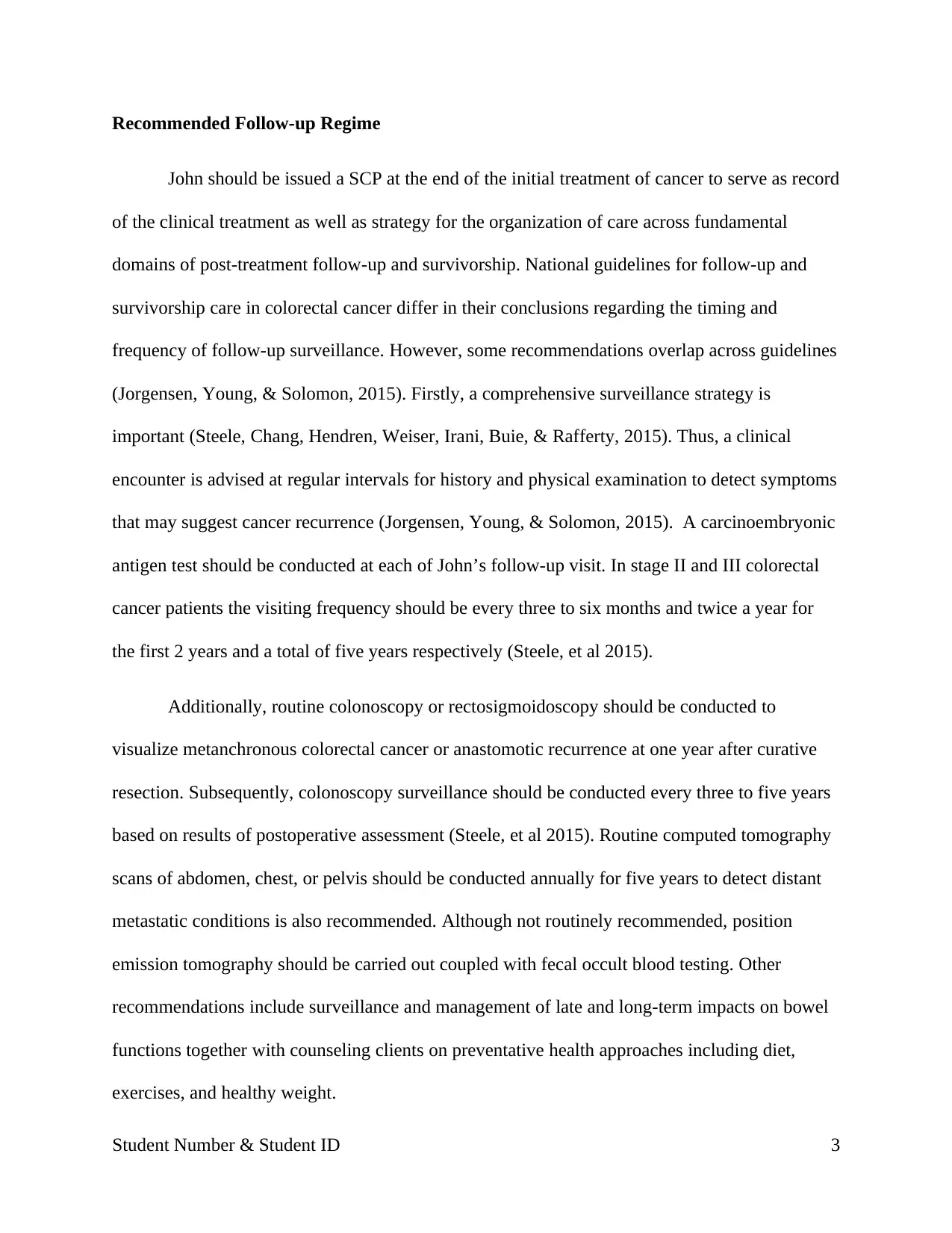
Recommended Follow-up Regime
John should be issued a SCP at the end of the initial treatment of cancer to serve as record
of the clinical treatment as well as strategy for the organization of care across fundamental
domains of post-treatment follow-up and survivorship. National guidelines for follow-up and
survivorship care in colorectal cancer differ in their conclusions regarding the timing and
frequency of follow-up surveillance. However, some recommendations overlap across guidelines
(Jorgensen, Young, & Solomon, 2015). Firstly, a comprehensive surveillance strategy is
important (Steele, Chang, Hendren, Weiser, Irani, Buie, & Rafferty, 2015). Thus, a clinical
encounter is advised at regular intervals for history and physical examination to detect symptoms
that may suggest cancer recurrence (Jorgensen, Young, & Solomon, 2015). A carcinoembryonic
antigen test should be conducted at each of John’s follow-up visit. In stage II and III colorectal
cancer patients the visiting frequency should be every three to six months and twice a year for
the first 2 years and a total of five years respectively (Steele, et al 2015).
Additionally, routine colonoscopy or rectosigmoidoscopy should be conducted to
visualize metanchronous colorectal cancer or anastomotic recurrence at one year after curative
resection. Subsequently, colonoscopy surveillance should be conducted every three to five years
based on results of postoperative assessment (Steele, et al 2015). Routine computed tomography
scans of abdomen, chest, or pelvis should be conducted annually for five years to detect distant
metastatic conditions is also recommended. Although not routinely recommended, position
emission tomography should be carried out coupled with fecal occult blood testing. Other
recommendations include surveillance and management of late and long-term impacts on bowel
functions together with counseling clients on preventative health approaches including diet,
exercises, and healthy weight.
Student Number & Student ID 3
John should be issued a SCP at the end of the initial treatment of cancer to serve as record
of the clinical treatment as well as strategy for the organization of care across fundamental
domains of post-treatment follow-up and survivorship. National guidelines for follow-up and
survivorship care in colorectal cancer differ in their conclusions regarding the timing and
frequency of follow-up surveillance. However, some recommendations overlap across guidelines
(Jorgensen, Young, & Solomon, 2015). Firstly, a comprehensive surveillance strategy is
important (Steele, Chang, Hendren, Weiser, Irani, Buie, & Rafferty, 2015). Thus, a clinical
encounter is advised at regular intervals for history and physical examination to detect symptoms
that may suggest cancer recurrence (Jorgensen, Young, & Solomon, 2015). A carcinoembryonic
antigen test should be conducted at each of John’s follow-up visit. In stage II and III colorectal
cancer patients the visiting frequency should be every three to six months and twice a year for
the first 2 years and a total of five years respectively (Steele, et al 2015).
Additionally, routine colonoscopy or rectosigmoidoscopy should be conducted to
visualize metanchronous colorectal cancer or anastomotic recurrence at one year after curative
resection. Subsequently, colonoscopy surveillance should be conducted every three to five years
based on results of postoperative assessment (Steele, et al 2015). Routine computed tomography
scans of abdomen, chest, or pelvis should be conducted annually for five years to detect distant
metastatic conditions is also recommended. Although not routinely recommended, position
emission tomography should be carried out coupled with fecal occult blood testing. Other
recommendations include surveillance and management of late and long-term impacts on bowel
functions together with counseling clients on preventative health approaches including diet,
exercises, and healthy weight.
Student Number & Student ID 3
⊘ This is a preview!⊘
Do you want full access?
Subscribe today to unlock all pages.

Trusted by 1+ million students worldwide

Referrals
To coordinate ongoing care patients sent for colonoscopy have to be examined by an
accredited surgeon or clinician in colonoscopy by Conjoint Committee of the Royal Australasian
College of Surgeons, Royal Australasian College of Physicians or Gastroenterological Society of
Australia (Australian Government Cancer Australia & Cancer Council, n.d.). Suitable
documentation should be sent with the patient, including findings of current clinical
investigations, a letter incorporating essential psychosocial, past, and family history together
with current medications and allergies, findings of prior relevant assessments, and notification if
interpretation service is necessary (Australian Government Cancer Australia & Cancer Council,
n.d.).
Collaborative Approaches to Education and Planning for Self-management
Survivorship Issues
There are different psychosocial, spiritual, physical, and social concerns that may be
experienced by collateral cancer survivors, including John. John may experience psychosocial
issues such as difficulties in sleeping, fatigue, fear or cancer recurrence, pain, reduced quality of
life, changes in sexual functioning, and financial challenges as outlined by (Averyt & Nishimoto,
2014). Physical concerns that may be experienced include issues related to body image, weight
gain or loss, fertility, and sexual, urinary, and bowel functioning (D’Souza, Daudt, & Kazanjian,
2016). Emotional concerns include anxiety, depression, and stress. With regard to spirituality,
colorectal cancer may induce deep existential issues raising questions such as why them, why
God would allow them to suffer, what will and happen to them if they die (Puchalski, 2012).
Interventions
Student Number & Student ID 4
To coordinate ongoing care patients sent for colonoscopy have to be examined by an
accredited surgeon or clinician in colonoscopy by Conjoint Committee of the Royal Australasian
College of Surgeons, Royal Australasian College of Physicians or Gastroenterological Society of
Australia (Australian Government Cancer Australia & Cancer Council, n.d.). Suitable
documentation should be sent with the patient, including findings of current clinical
investigations, a letter incorporating essential psychosocial, past, and family history together
with current medications and allergies, findings of prior relevant assessments, and notification if
interpretation service is necessary (Australian Government Cancer Australia & Cancer Council,
n.d.).
Collaborative Approaches to Education and Planning for Self-management
Survivorship Issues
There are different psychosocial, spiritual, physical, and social concerns that may be
experienced by collateral cancer survivors, including John. John may experience psychosocial
issues such as difficulties in sleeping, fatigue, fear or cancer recurrence, pain, reduced quality of
life, changes in sexual functioning, and financial challenges as outlined by (Averyt & Nishimoto,
2014). Physical concerns that may be experienced include issues related to body image, weight
gain or loss, fertility, and sexual, urinary, and bowel functioning (D’Souza, Daudt, & Kazanjian,
2016). Emotional concerns include anxiety, depression, and stress. With regard to spirituality,
colorectal cancer may induce deep existential issues raising questions such as why them, why
God would allow them to suffer, what will and happen to them if they die (Puchalski, 2012).
Interventions
Student Number & Student ID 4
Paraphrase This Document
Need a fresh take? Get an instant paraphrase of this document with our AI Paraphraser
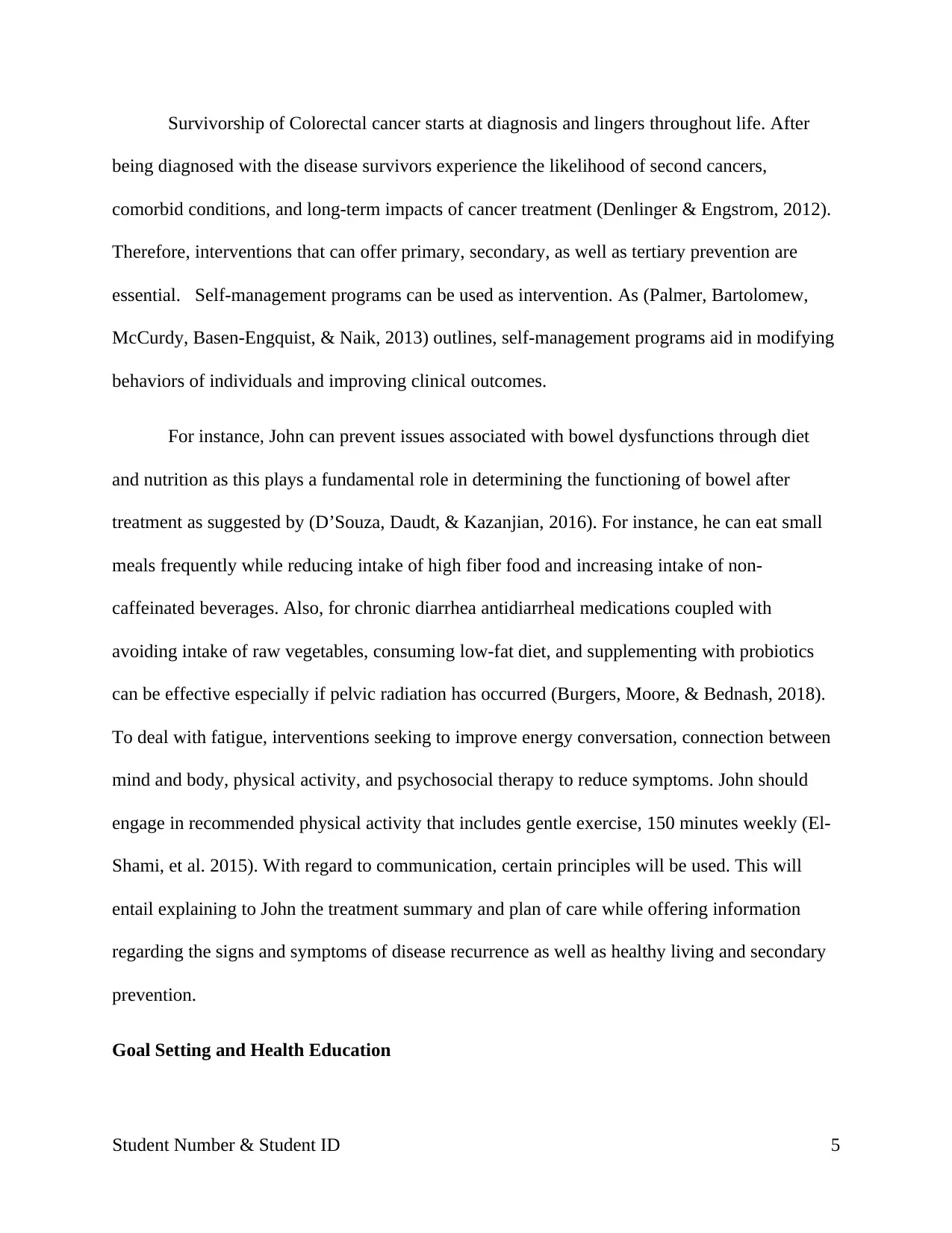
Survivorship of Colorectal cancer starts at diagnosis and lingers throughout life. After
being diagnosed with the disease survivors experience the likelihood of second cancers,
comorbid conditions, and long-term impacts of cancer treatment (Denlinger & Engstrom, 2012).
Therefore, interventions that can offer primary, secondary, as well as tertiary prevention are
essential. Self-management programs can be used as intervention. As (Palmer, Bartolomew,
McCurdy, Basen-Engquist, & Naik, 2013) outlines, self-management programs aid in modifying
behaviors of individuals and improving clinical outcomes.
For instance, John can prevent issues associated with bowel dysfunctions through diet
and nutrition as this plays a fundamental role in determining the functioning of bowel after
treatment as suggested by (D’Souza, Daudt, & Kazanjian, 2016). For instance, he can eat small
meals frequently while reducing intake of high fiber food and increasing intake of non-
caffeinated beverages. Also, for chronic diarrhea antidiarrheal medications coupled with
avoiding intake of raw vegetables, consuming low-fat diet, and supplementing with probiotics
can be effective especially if pelvic radiation has occurred (Burgers, Moore, & Bednash, 2018).
To deal with fatigue, interventions seeking to improve energy conversation, connection between
mind and body, physical activity, and psychosocial therapy to reduce symptoms. John should
engage in recommended physical activity that includes gentle exercise, 150 minutes weekly (El-
Shami, et al. 2015). With regard to communication, certain principles will be used. This will
entail explaining to John the treatment summary and plan of care while offering information
regarding the signs and symptoms of disease recurrence as well as healthy living and secondary
prevention.
Goal Setting and Health Education
Student Number & Student ID 5
being diagnosed with the disease survivors experience the likelihood of second cancers,
comorbid conditions, and long-term impacts of cancer treatment (Denlinger & Engstrom, 2012).
Therefore, interventions that can offer primary, secondary, as well as tertiary prevention are
essential. Self-management programs can be used as intervention. As (Palmer, Bartolomew,
McCurdy, Basen-Engquist, & Naik, 2013) outlines, self-management programs aid in modifying
behaviors of individuals and improving clinical outcomes.
For instance, John can prevent issues associated with bowel dysfunctions through diet
and nutrition as this plays a fundamental role in determining the functioning of bowel after
treatment as suggested by (D’Souza, Daudt, & Kazanjian, 2016). For instance, he can eat small
meals frequently while reducing intake of high fiber food and increasing intake of non-
caffeinated beverages. Also, for chronic diarrhea antidiarrheal medications coupled with
avoiding intake of raw vegetables, consuming low-fat diet, and supplementing with probiotics
can be effective especially if pelvic radiation has occurred (Burgers, Moore, & Bednash, 2018).
To deal with fatigue, interventions seeking to improve energy conversation, connection between
mind and body, physical activity, and psychosocial therapy to reduce symptoms. John should
engage in recommended physical activity that includes gentle exercise, 150 minutes weekly (El-
Shami, et al. 2015). With regard to communication, certain principles will be used. This will
entail explaining to John the treatment summary and plan of care while offering information
regarding the signs and symptoms of disease recurrence as well as healthy living and secondary
prevention.
Goal Setting and Health Education
Student Number & Student ID 5
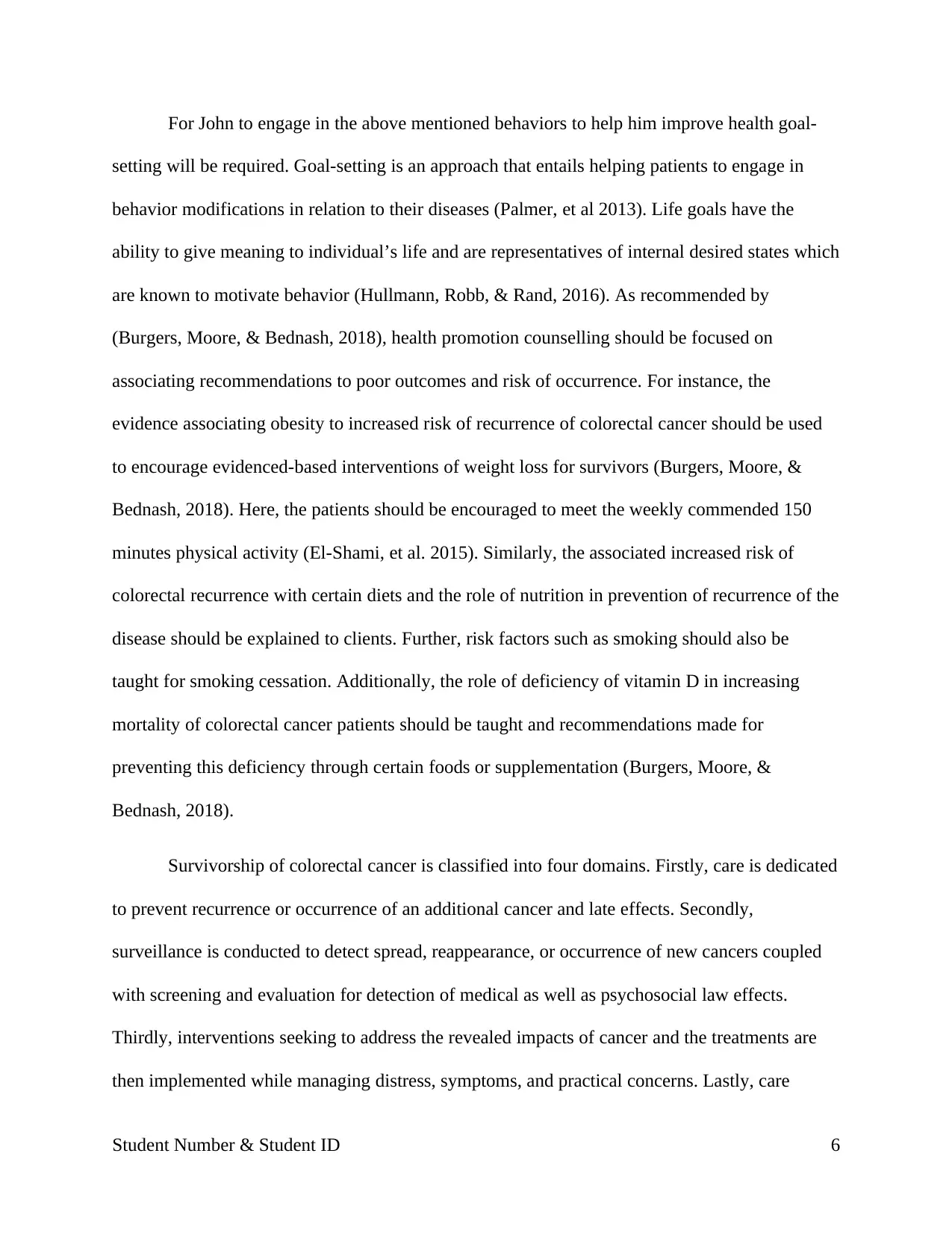
For John to engage in the above mentioned behaviors to help him improve health goal-
setting will be required. Goal-setting is an approach that entails helping patients to engage in
behavior modifications in relation to their diseases (Palmer, et al 2013). Life goals have the
ability to give meaning to individual’s life and are representatives of internal desired states which
are known to motivate behavior (Hullmann, Robb, & Rand, 2016). As recommended by
(Burgers, Moore, & Bednash, 2018), health promotion counselling should be focused on
associating recommendations to poor outcomes and risk of occurrence. For instance, the
evidence associating obesity to increased risk of recurrence of colorectal cancer should be used
to encourage evidenced-based interventions of weight loss for survivors (Burgers, Moore, &
Bednash, 2018). Here, the patients should be encouraged to meet the weekly commended 150
minutes physical activity (El-Shami, et al. 2015). Similarly, the associated increased risk of
colorectal recurrence with certain diets and the role of nutrition in prevention of recurrence of the
disease should be explained to clients. Further, risk factors such as smoking should also be
taught for smoking cessation. Additionally, the role of deficiency of vitamin D in increasing
mortality of colorectal cancer patients should be taught and recommendations made for
preventing this deficiency through certain foods or supplementation (Burgers, Moore, &
Bednash, 2018).
Survivorship of colorectal cancer is classified into four domains. Firstly, care is dedicated
to prevent recurrence or occurrence of an additional cancer and late effects. Secondly,
surveillance is conducted to detect spread, reappearance, or occurrence of new cancers coupled
with screening and evaluation for detection of medical as well as psychosocial law effects.
Thirdly, interventions seeking to address the revealed impacts of cancer and the treatments are
then implemented while managing distress, symptoms, and practical concerns. Lastly, care
Student Number & Student ID 6
setting will be required. Goal-setting is an approach that entails helping patients to engage in
behavior modifications in relation to their diseases (Palmer, et al 2013). Life goals have the
ability to give meaning to individual’s life and are representatives of internal desired states which
are known to motivate behavior (Hullmann, Robb, & Rand, 2016). As recommended by
(Burgers, Moore, & Bednash, 2018), health promotion counselling should be focused on
associating recommendations to poor outcomes and risk of occurrence. For instance, the
evidence associating obesity to increased risk of recurrence of colorectal cancer should be used
to encourage evidenced-based interventions of weight loss for survivors (Burgers, Moore, &
Bednash, 2018). Here, the patients should be encouraged to meet the weekly commended 150
minutes physical activity (El-Shami, et al. 2015). Similarly, the associated increased risk of
colorectal recurrence with certain diets and the role of nutrition in prevention of recurrence of the
disease should be explained to clients. Further, risk factors such as smoking should also be
taught for smoking cessation. Additionally, the role of deficiency of vitamin D in increasing
mortality of colorectal cancer patients should be taught and recommendations made for
preventing this deficiency through certain foods or supplementation (Burgers, Moore, &
Bednash, 2018).
Survivorship of colorectal cancer is classified into four domains. Firstly, care is dedicated
to prevent recurrence or occurrence of an additional cancer and late effects. Secondly,
surveillance is conducted to detect spread, reappearance, or occurrence of new cancers coupled
with screening and evaluation for detection of medical as well as psychosocial law effects.
Thirdly, interventions seeking to address the revealed impacts of cancer and the treatments are
then implemented while managing distress, symptoms, and practical concerns. Lastly, care
Student Number & Student ID 6
⊘ This is a preview!⊘
Do you want full access?
Subscribe today to unlock all pages.

Trusted by 1+ million students worldwide
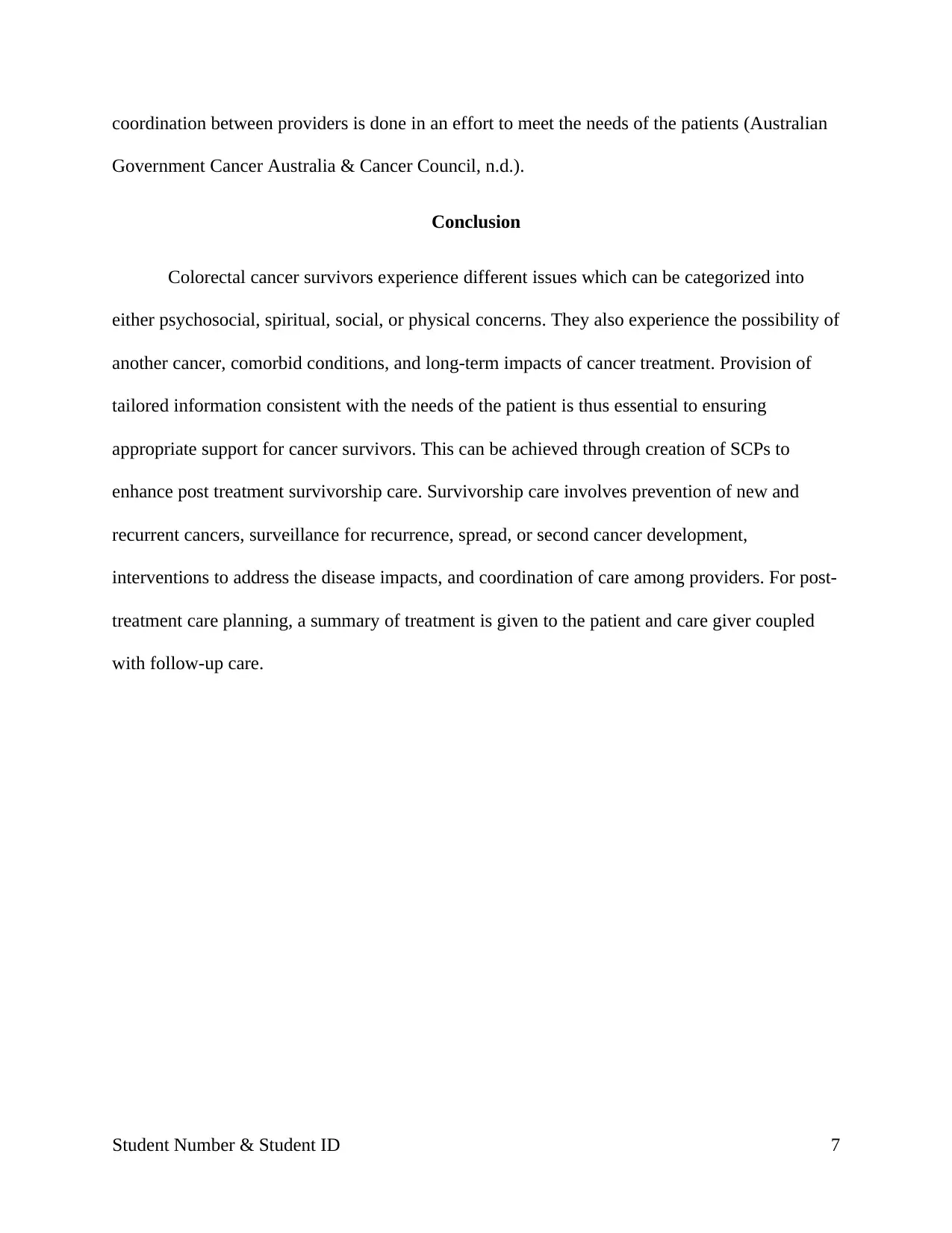
coordination between providers is done in an effort to meet the needs of the patients (Australian
Government Cancer Australia & Cancer Council, n.d.).
Conclusion
Colorectal cancer survivors experience different issues which can be categorized into
either psychosocial, spiritual, social, or physical concerns. They also experience the possibility of
another cancer, comorbid conditions, and long-term impacts of cancer treatment. Provision of
tailored information consistent with the needs of the patient is thus essential to ensuring
appropriate support for cancer survivors. This can be achieved through creation of SCPs to
enhance post treatment survivorship care. Survivorship care involves prevention of new and
recurrent cancers, surveillance for recurrence, spread, or second cancer development,
interventions to address the disease impacts, and coordination of care among providers. For post-
treatment care planning, a summary of treatment is given to the patient and care giver coupled
with follow-up care.
Student Number & Student ID 7
Government Cancer Australia & Cancer Council, n.d.).
Conclusion
Colorectal cancer survivors experience different issues which can be categorized into
either psychosocial, spiritual, social, or physical concerns. They also experience the possibility of
another cancer, comorbid conditions, and long-term impacts of cancer treatment. Provision of
tailored information consistent with the needs of the patient is thus essential to ensuring
appropriate support for cancer survivors. This can be achieved through creation of SCPs to
enhance post treatment survivorship care. Survivorship care involves prevention of new and
recurrent cancers, surveillance for recurrence, spread, or second cancer development,
interventions to address the disease impacts, and coordination of care among providers. For post-
treatment care planning, a summary of treatment is given to the patient and care giver coupled
with follow-up care.
Student Number & Student ID 7
Paraphrase This Document
Need a fresh take? Get an instant paraphrase of this document with our AI Paraphraser
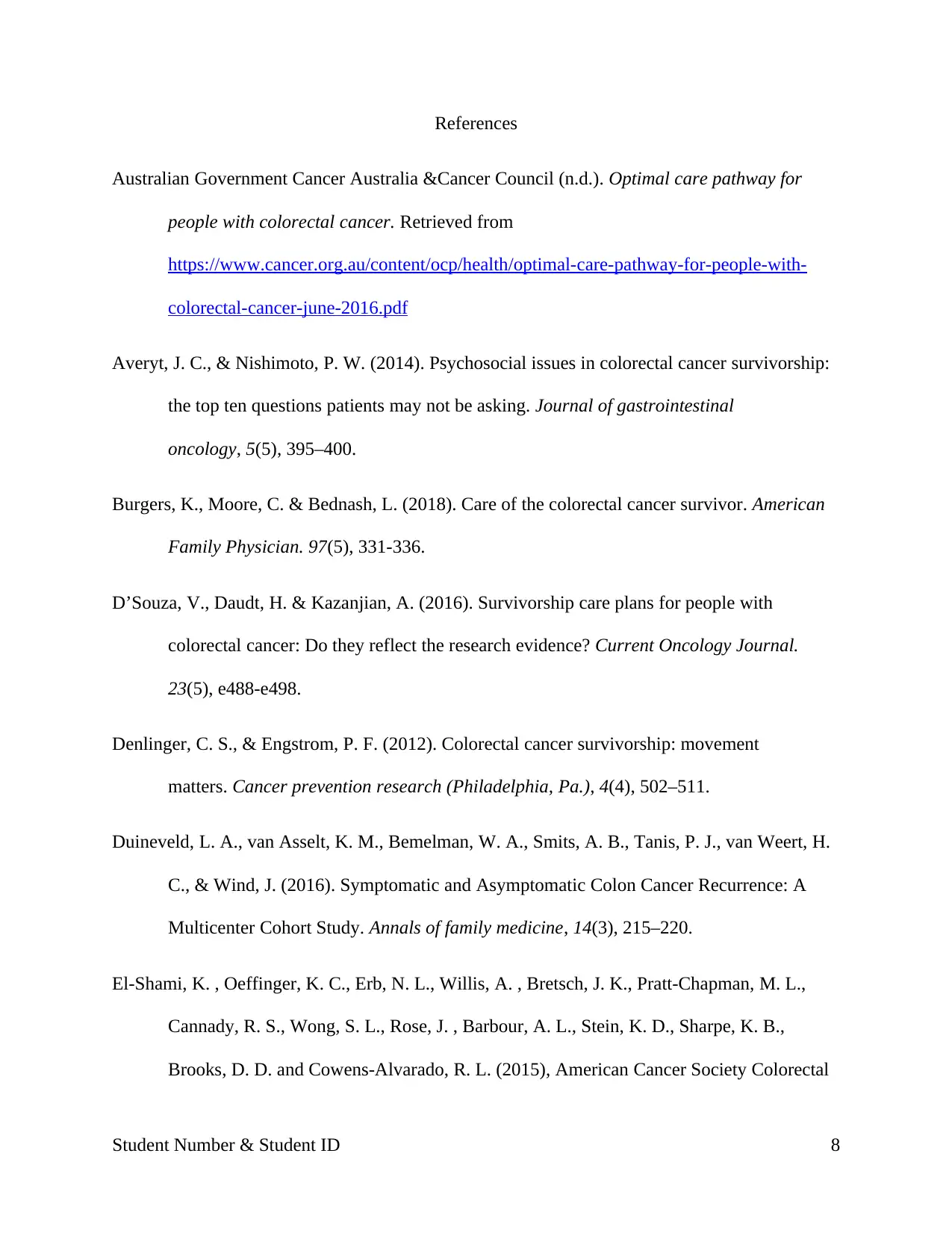
References
Australian Government Cancer Australia &Cancer Council (n.d.). Optimal care pathway for
people with colorectal cancer. Retrieved from
https://www.cancer.org.au/content/ocp/health/optimal-care-pathway-for-people-with-
colorectal-cancer-june-2016.pdf
Averyt, J. C., & Nishimoto, P. W. (2014). Psychosocial issues in colorectal cancer survivorship:
the top ten questions patients may not be asking. Journal of gastrointestinal
oncology, 5(5), 395–400.
Burgers, K., Moore, C. & Bednash, L. (2018). Care of the colorectal cancer survivor. American
Family Physician. 97(5), 331-336.
D’Souza, V., Daudt, H. & Kazanjian, A. (2016). Survivorship care plans for people with
colorectal cancer: Do they reflect the research evidence? Current Oncology Journal.
23(5), e488-e498.
Denlinger, C. S., & Engstrom, P. F. (2012). Colorectal cancer survivorship: movement
matters. Cancer prevention research (Philadelphia, Pa.), 4(4), 502–511.
Duineveld, L. A., van Asselt, K. M., Bemelman, W. A., Smits, A. B., Tanis, P. J., van Weert, H.
C., & Wind, J. (2016). Symptomatic and Asymptomatic Colon Cancer Recurrence: A
Multicenter Cohort Study. Annals of family medicine, 14(3), 215–220.
El‐Shami, K. , Oeffinger, K. C., Erb, N. L., Willis, A. , Bretsch, J. K., Pratt‐Chapman, M. L.,
Cannady, R. S., Wong, S. L., Rose, J. , Barbour, A. L., Stein, K. D., Sharpe, K. B.,
Brooks, D. D. and Cowens‐Alvarado, R. L. (2015), American Cancer Society Colorectal
Student Number & Student ID 8
Australian Government Cancer Australia &Cancer Council (n.d.). Optimal care pathway for
people with colorectal cancer. Retrieved from
https://www.cancer.org.au/content/ocp/health/optimal-care-pathway-for-people-with-
colorectal-cancer-june-2016.pdf
Averyt, J. C., & Nishimoto, P. W. (2014). Psychosocial issues in colorectal cancer survivorship:
the top ten questions patients may not be asking. Journal of gastrointestinal
oncology, 5(5), 395–400.
Burgers, K., Moore, C. & Bednash, L. (2018). Care of the colorectal cancer survivor. American
Family Physician. 97(5), 331-336.
D’Souza, V., Daudt, H. & Kazanjian, A. (2016). Survivorship care plans for people with
colorectal cancer: Do they reflect the research evidence? Current Oncology Journal.
23(5), e488-e498.
Denlinger, C. S., & Engstrom, P. F. (2012). Colorectal cancer survivorship: movement
matters. Cancer prevention research (Philadelphia, Pa.), 4(4), 502–511.
Duineveld, L. A., van Asselt, K. M., Bemelman, W. A., Smits, A. B., Tanis, P. J., van Weert, H.
C., & Wind, J. (2016). Symptomatic and Asymptomatic Colon Cancer Recurrence: A
Multicenter Cohort Study. Annals of family medicine, 14(3), 215–220.
El‐Shami, K. , Oeffinger, K. C., Erb, N. L., Willis, A. , Bretsch, J. K., Pratt‐Chapman, M. L.,
Cannady, R. S., Wong, S. L., Rose, J. , Barbour, A. L., Stein, K. D., Sharpe, K. B.,
Brooks, D. D. and Cowens‐Alvarado, R. L. (2015), American Cancer Society Colorectal
Student Number & Student ID 8
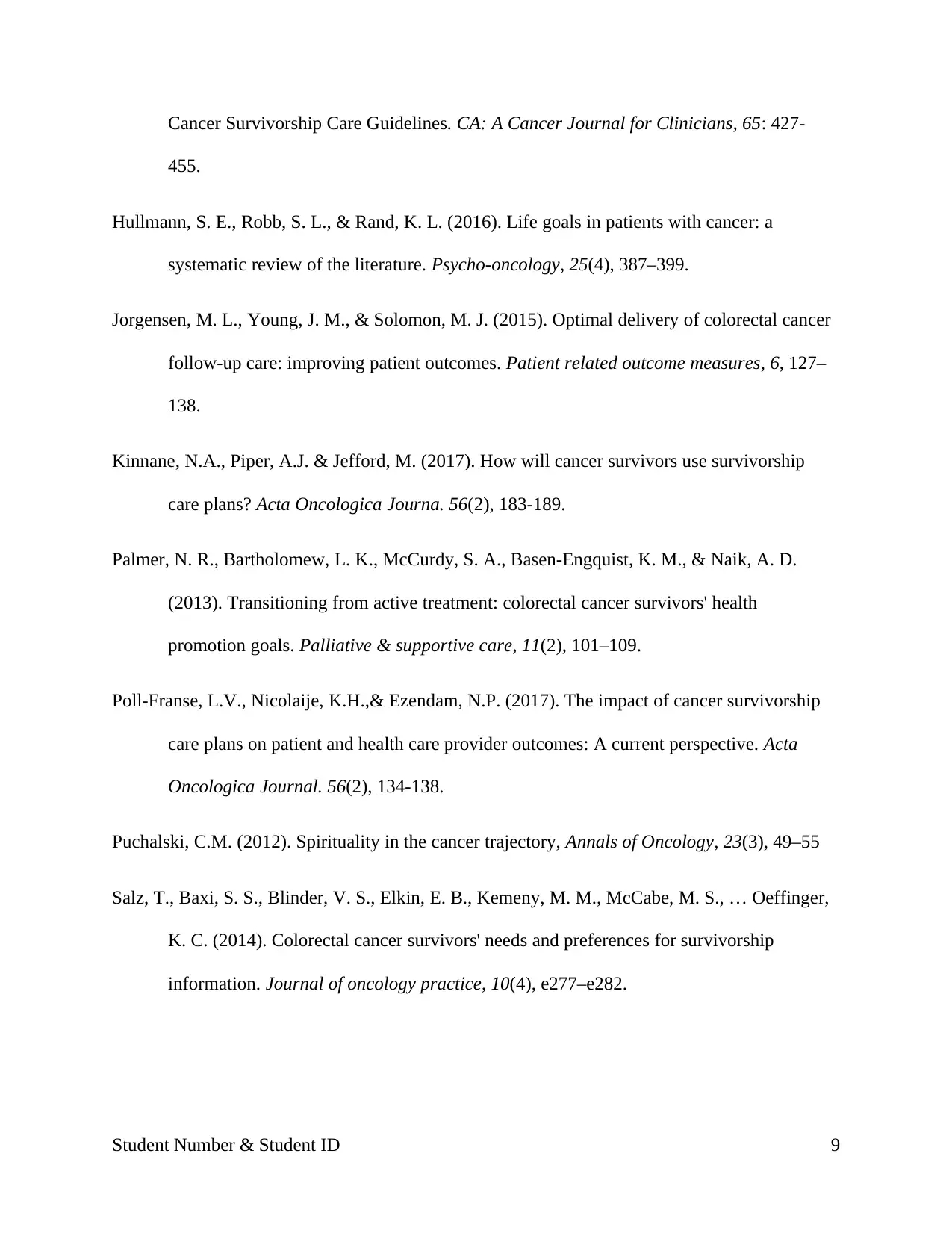
Cancer Survivorship Care Guidelines. CA: A Cancer Journal for Clinicians, 65: 427-
455.
Hullmann, S. E., Robb, S. L., & Rand, K. L. (2016). Life goals in patients with cancer: a
systematic review of the literature. Psycho-oncology, 25(4), 387–399.
Jorgensen, M. L., Young, J. M., & Solomon, M. J. (2015). Optimal delivery of colorectal cancer
follow-up care: improving patient outcomes. Patient related outcome measures, 6, 127–
138.
Kinnane, N.A., Piper, A.J. & Jefford, M. (2017). How will cancer survivors use survivorship
care plans? Acta Oncologica Journa. 56(2), 183-189.
Palmer, N. R., Bartholomew, L. K., McCurdy, S. A., Basen-Engquist, K. M., & Naik, A. D.
(2013). Transitioning from active treatment: colorectal cancer survivors' health
promotion goals. Palliative & supportive care, 11(2), 101–109.
Poll-Franse, L.V., Nicolaije, K.H.,& Ezendam, N.P. (2017). The impact of cancer survivorship
care plans on patient and health care provider outcomes: A current perspective. Acta
Oncologica Journal. 56(2), 134-138.
Puchalski, C.M. (2012). Spirituality in the cancer trajectory, Annals of Oncology, 23(3), 49–55
Salz, T., Baxi, S. S., Blinder, V. S., Elkin, E. B., Kemeny, M. M., McCabe, M. S., … Oeffinger,
K. C. (2014). Colorectal cancer survivors' needs and preferences for survivorship
information. Journal of oncology practice, 10(4), e277–e282.
Student Number & Student ID 9
455.
Hullmann, S. E., Robb, S. L., & Rand, K. L. (2016). Life goals in patients with cancer: a
systematic review of the literature. Psycho-oncology, 25(4), 387–399.
Jorgensen, M. L., Young, J. M., & Solomon, M. J. (2015). Optimal delivery of colorectal cancer
follow-up care: improving patient outcomes. Patient related outcome measures, 6, 127–
138.
Kinnane, N.A., Piper, A.J. & Jefford, M. (2017). How will cancer survivors use survivorship
care plans? Acta Oncologica Journa. 56(2), 183-189.
Palmer, N. R., Bartholomew, L. K., McCurdy, S. A., Basen-Engquist, K. M., & Naik, A. D.
(2013). Transitioning from active treatment: colorectal cancer survivors' health
promotion goals. Palliative & supportive care, 11(2), 101–109.
Poll-Franse, L.V., Nicolaije, K.H.,& Ezendam, N.P. (2017). The impact of cancer survivorship
care plans on patient and health care provider outcomes: A current perspective. Acta
Oncologica Journal. 56(2), 134-138.
Puchalski, C.M. (2012). Spirituality in the cancer trajectory, Annals of Oncology, 23(3), 49–55
Salz, T., Baxi, S. S., Blinder, V. S., Elkin, E. B., Kemeny, M. M., McCabe, M. S., … Oeffinger,
K. C. (2014). Colorectal cancer survivors' needs and preferences for survivorship
information. Journal of oncology practice, 10(4), e277–e282.
Student Number & Student ID 9
⊘ This is a preview!⊘
Do you want full access?
Subscribe today to unlock all pages.

Trusted by 1+ million students worldwide

Steele, S.R., Chang, G.J., Hendren, S., Weiser, M., Irani, J., Buie, D., & Rafferty, J.F. (2015).
Practice guideline for the surveillance of patients after curative treatment of colon and
rectal cancer. Diseases of the Colon & Rectum. 58(8), 713-725.
Student Number & Student ID 10
Practice guideline for the surveillance of patients after curative treatment of colon and
rectal cancer. Diseases of the Colon & Rectum. 58(8), 713-725.
Student Number & Student ID 10
1 out of 10
Related Documents
Your All-in-One AI-Powered Toolkit for Academic Success.
+13062052269
info@desklib.com
Available 24*7 on WhatsApp / Email
![[object Object]](/_next/static/media/star-bottom.7253800d.svg)
Unlock your academic potential
Copyright © 2020–2025 A2Z Services. All Rights Reserved. Developed and managed by ZUCOL.




